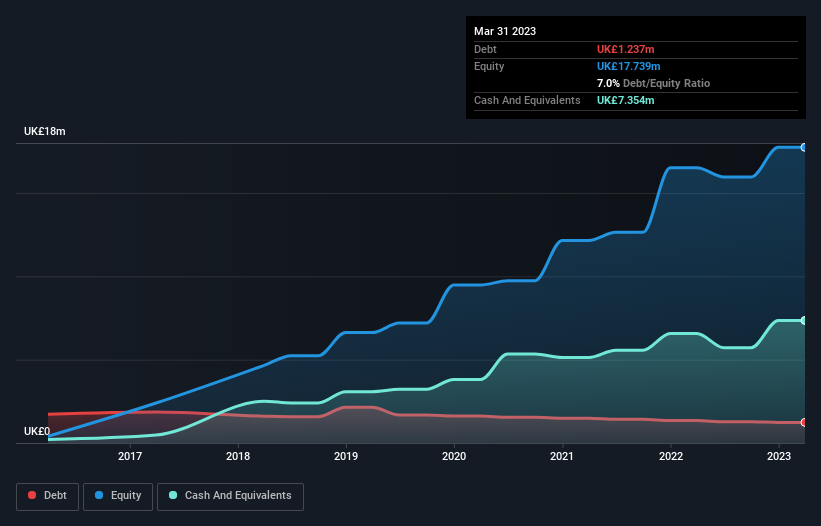The external fund manager backed by Berkshire Hathaway's Charlie Munger, Li Lu, makes no bones about it when he says 'The biggest investment risk is not the volatility of prices, but whether you will suffer a permanent loss of capital.' It's only natural to consider a company's balance sheet when you examine how risky it is, since debt is often involved when a business collapses. We can see that Cake Box Holdings Plc (LON:CBOX) does use debt in its business. But the real question is whether this debt is making the company risky.
When Is Debt Dangerous?
Debt assists a business until the business has trouble paying it off, either with new capital or with free cash flow. Ultimately, if the company can't fulfill its legal obligations to repay debt, shareholders could walk away with nothing. However, a more frequent (but still costly) occurrence is where a company must issue shares at bargain-basement prices, permanently diluting shareholders, just to shore up its balance sheet. Of course, plenty of companies use debt to fund growth, without any negative consequences. When we examine debt levels, we first consider both cash and debt levels, together.
Check out our latest analysis for Cake Box Holdings
How Much Debt Does Cake Box Holdings Carry?
You can click the graphic below for the historical numbers, but it shows that Cake Box Holdings had UK£1.24m of debt in March 2023, down from UK£1.35m, one year before. But it also has UK£7.35m in cash to offset that, meaning it has UK£6.12m net cash.

A Look At Cake Box Holdings' Liabilities
The latest balance sheet data shows that Cake Box Holdings had liabilities of UK£4.68m due within a year, and liabilities of UK£5.41m falling due after that. Offsetting these obligations, it had cash of UK£7.35m as well as receivables valued at UK£2.36m due within 12 months. So its liabilities total UK£371.0k more than the combination of its cash and short-term receivables.
This state of affairs indicates that Cake Box Holdings' balance sheet looks quite solid, as its total liabilities are just about equal to its liquid assets. So it's very unlikely that the UK£71.4m company is short on cash, but still worth keeping an eye on the balance sheet. Despite its noteworthy liabilities, Cake Box Holdings boasts net cash, so it's fair to say it does not have a heavy debt load!
The modesty of its debt load may become crucial for Cake Box Holdings if management cannot prevent a repeat of the 21% cut to EBIT over the last year. When it comes to paying off debt, falling earnings are no more useful than sugary sodas are for your health. There's no doubt that we learn most about debt from the balance sheet. But it is future earnings, more than anything, that will determine Cake Box Holdings's ability to maintain a healthy balance sheet going forward. So if you're focused on the future you can check out this free report showing analyst profit forecasts.
Finally, a business needs free cash flow to pay off debt; accounting profits just don't cut it. While Cake Box Holdings has net cash on its balance sheet, it's still worth taking a look at its ability to convert earnings before interest and tax (EBIT) to free cash flow, to help us understand how quickly it is building (or eroding) that cash balance. During the last three years, Cake Box Holdings produced sturdy free cash flow equating to 70% of its EBIT, about what we'd expect. This cold hard cash means it can reduce its debt when it wants to.
Summing Up
We could understand if investors are concerned about Cake Box Holdings's liabilities, but we can be reassured by the fact it has has net cash of UK£6.12m. The cherry on top was that in converted 70% of that EBIT to free cash flow, bringing in UK£4.3m. So we don't have any problem with Cake Box Holdings's use of debt. When analysing debt levels, the balance sheet is the obvious place to start. However, not all investment risk resides within the balance sheet - far from it. For instance, we've identified 3 warning signs for Cake Box Holdings that you should be aware of.
At the end of the day, it's often better to focus on companies that are free from net debt. You can access our special list of such companies (all with a track record of profit growth). It's free.
New: AI Stock Screener & Alerts
Our new AI Stock Screener scans the market every day to uncover opportunities.
• Dividend Powerhouses (3%+ Yield)
• Undervalued Small Caps with Insider Buying
• High growth Tech and AI Companies
Or build your own from over 50 metrics.
Have feedback on this article? Concerned about the content? Get in touch with us directly. Alternatively, email editorial-team (at) simplywallst.com.
This article by Simply Wall St is general in nature. We provide commentary based on historical data and analyst forecasts only using an unbiased methodology and our articles are not intended to be financial advice. It does not constitute a recommendation to buy or sell any stock, and does not take account of your objectives, or your financial situation. We aim to bring you long-term focused analysis driven by fundamental data. Note that our analysis may not factor in the latest price-sensitive company announcements or qualitative material. Simply Wall St has no position in any stocks mentioned.
About AIM:CBOX
Cake Box Holdings
Engages in the retail of fresh cream celebration cakes in the United Kingdom.
Outstanding track record and good value.
Market Insights
Community Narratives



